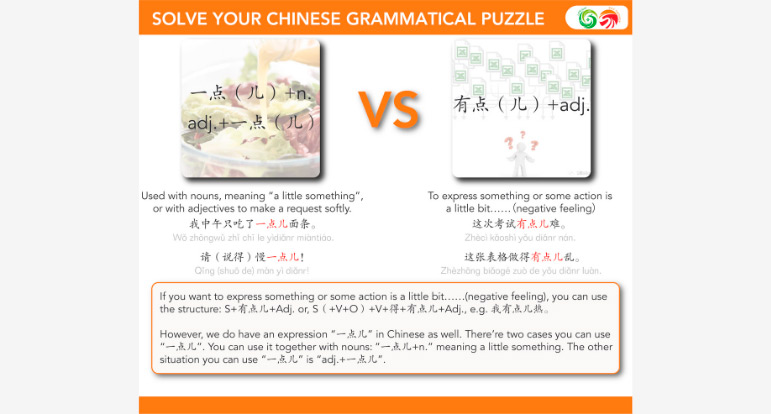Oct.08, 2019
Do you remember we talked about one "landmine" in spoken Chinese about separable verbs?
I hope you have fully understood these words now and become more confident in using them when you speak Chinese.
Click here if you have missed the article about separable verbs.
Today let's sweep out another "landmine"!
First, let's take a look at these sentences that we hear a lot from Chinese learners who frequently freak out Chinese teachers:
我一点(儿)热。
Wǒ yìdiǎn(r) rè。
雨下得一点儿大。
Yǔ xià de yìdiǎn(r) dà。
These two sentences are supposed to mean "I feel a bit hot" and "it rains a little heavily." But unfortunately, they are incorrect!
I know it's very easy for our students to understand "一点(儿)" influenced by English translation "a little" as a degree. But actually, for "a little+adj.", Chinese people use another expression: "有点(儿)".
For the situations above, we say:
我有点(儿)热。
Wǒ yǒu diǎn(r) rè.
I feel a bit hot.
雨下得有点儿大。
Yǔ xià de yǒu diǎn(r) dà.
It rains a bit heavily.
To sum up, if you want to express something or some action is, a little bit..... (negative feeling), you can use the structure:
S+有点儿+Adj.
or
S(+V+O)+V+得+有点儿+Adj.
For more examples:
这次考试有点儿难。
Zhè cì kǎoshì yǒu diǎn(r) nán.
This examination is a bit difficult.
这张表格做得有点儿乱。
Zhè zhāng biǎogé zuò de yǒu diǎn(r) luàn.
This spreadsheet is made a bit messy.
However, we do have an expression “一点儿” in Chinese as well.
There are two cases you can use “一点儿”.
“一点儿” could be used together with nouns: “一点儿+N.” meaning a little something.
For example:
我中午只吃了一点儿面条。
Wǒ zhōngwǔ zhǐ chī le yìdiǎnr miàntiáo.
I only ate a little bit of the noodles at noon.
你饿吗?我带了一点面包。
Nǐ è ma?wǒ dài le yìdiǎn miànbāo.
Are you hungry? I took a little piece of bread with me.
The other situation you can use “一点儿” is "adj.+一点儿".
When you bargain in some markets, you will use this phrase a lot:
"太贵了!便宜一点儿!"
Tài guì le!Piányi yìdiǎnr!
Too expensive! Could it be a little cheaper?
See? You use this phrase to express softly your expectations and requirement.
If you're talking with a Chinese native speaker and she/he is speaking too fast, how would you slow him/her down?
Yes!
Use this structure, (V+de+) adj. + 一点儿:
请(说得)慢一点儿!
Qǐng (shuō de) màn yì diǎnr!
Please speak a little slower!
In this way, you can express your requirements in a softer manner:
请开得慢一点儿。
Qǐng kāi de màn yì diǎnr.
Please drive a bit slower.
请写得快一点儿。
Qǐng xiě de kuài yìdiǎnr.
Please write a bit faster.
请放得多一点儿。
Qǐng fàng de duō duò diǎnr.
Please put a bit more.
You got the difference between "一点儿+N" and "Adj.+有点儿"?
Next time don't use them incorrectly!!
Here's a little bit of an exercise(一点儿练习 or 有点儿练习?) to test yourself. Please think about how to say these in Chinese:
I think he is a little angry now.
I don't believe this is a little bit of work said the boss.
Sorry. Could you please lower your voice a little?
Leave your answers in the comments and I will write back to you!

Most Popular Posts
